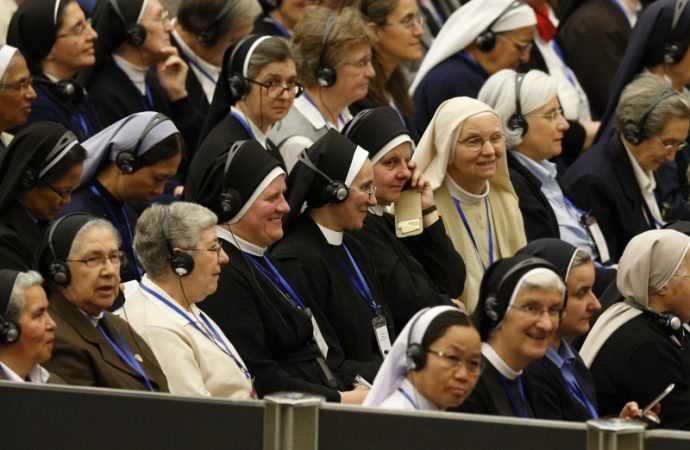Vatican Editor Says Pope Must Face Questions on Women, Sex Abuse
By Ines San Martin
According to an Italian historian who presides over a monthly Vatican magazine on women, both women and clerical sexual abuse are problems that will continue to dog Pope Francis until they’re resolved. “[A] question arises, that of women who are nonexistent and invisible in the eyes of ecclesiastical hierarchies, accustomed to taking their service for granted,” Lucetta Scaraffia wrote in a recent op-ed for the Spanish newspaper El Pais. “Today religious [women] no longer accept shameful conditions of exploitation and humiliation.” According to Scaraffia, during the first years of his pontificate, Francis led a revolution in the life of the Church, which in previous years had focused too much on bioethics. She called those issues “difficult and risky to face, and before which the Church, whose position always seemed very rigid, didn’t always succeed in presenting herself as a defender of the weak.” In the piece published on Monday, Scaraffia also wrote that Francis put the poor back at the center of the Church’s core concerns, represented mainly by migrants, but also the “inhabitants of the most miserable areas of the third world, oppressed by misery and ecological disasters.” He also extended the “mercy of the Church to those who, after [the end of their first] marriage, had formed a new family, as well as women who asked for forgiveness for the sin of abortion, and who until [the pope’s] providential intervention had to go to a bishop to obtain absolution.” In his 2016 post-synod Apostolic Exhortation Amoris Laetitia, Francis opened a window for civilly divorced and remarried Catholic to access the sacraments after a path of discernment. On abortion, during the 2016 Extraordinary Jubilee year of Mercy, the pontiff granted every priest in the world permission to forgive the sin of abortion for everyone involved - not only the mother, but also the doctors, nurses and those who accompanied, or forced, the woman to terminate a pregnancy. In her column, Scaraffia defines these decisions by Francis as “fundamental” and credits them with putting the Church, “a very controversial institution criticized in the face of modernity,” once again on the “side of the good.” She also writes that while the kind of Vatican leaks that bedeviled Pope emeritus Benedict XVI seem to have dried up under Francis, the scandals of pedophilia remain a serious challenge. “The new accusations against members of the clergy (among them famous and powerful cardinals such as Australian George Pell, American Theodore McCarrick and French Philippe Barbarin) have come suddenly and unexpectedly, and affect not only countries in which similar scandals have already occurred, such as the United States and Germany, but also Latin America and even to Argentina,” she writes. “It does not seem that the scandal provoked by the accusations of abuses, cover-ups and lack of sensitivity towards the victims is going to be extinguished in the short term: A devastating image that the Church must improve with concrete, severe and urgent measures,” Scaraffia argues. But, she adds, on top of all of this, there’s also the issue of women. Women, Scaraffia writes, are “nonexistent and invisible,” and the hierarchy takes them for granted. They had no voice in a Synod of Bishops held in Rome in October, and episodes of rebellion, which “abound,” are often ignored, both by priests and bishops and by the media. Ignoring women, she wrote, is “causing an undervalued phenomenon to reappear, that of abuses and the violence of members of the clergy towards religious women, classified by hierarchs as romantic relationships.” But instead of being consensual romantic relationships, they represent the imposition of a man in a position of power over a vulnerable woman. Sometimes, they are forced to endure the unwanted relationship by their own superiors, who “fear reprisals against the [religious] institution will be taken.” “The crisis is confirmed by the rapid and dramatic fall of feminine vocations: without the nuns, who work intensely and desperately throughout the world, giving a concrete Christian witness, how will the institution resist?” Scaraffia wonders. According to the historian, no one seems to realize just how serious the problem is, nor to perceive that violence towards women by priests and bishops leads to abortion, which, she said, in many cases is paid for by the abuser because nuns have no money. In addition, young lay women, their mothers and grandmothers, are leaving the Church, meaning they no longer support parishes as catechists or organizing assistance to the poor and the elderly. Despite the dire situation, she continues, the hierarchy “only thinks of men.” Discourses on vocations are centered on priests, and not even the Oct. 2018 Synod of Bishops on young people, the faith and vocational discernment confronted the problem faced by young women. Most observers say Francis has had a mixed track record with women, always upholding the teaching of the Catholic Church that the priesthood is only for men. He created a commission to look into the historic role of female deacons, but almost a year after the body presented the pope with its conclusions, no further announcement has been made. He’s put a handful of women in key places in the Vatican curia, but all of them answer to men, even when ordination is not a requirement to lead an office. And those women tend to deflect when asked for interviews, telling journalists to speak with the prefect instead. This is perhaps why Scaraffia closes her column writing: “Despite the numerous calls of Pope Francis, the old and consolidated custom of considering women something non-existent has not yet found any serious response.”
|
.
Any original material on these pages is copyright © BishopAccountability.org 2004. Reproduce freely with attribution.
